人教新目标版九年级英语全册《Unit13We’retryingtosavetheearth》第5课时
新人教版九年级英语下册Unit 13 We’re trying to save the earth!要点详解
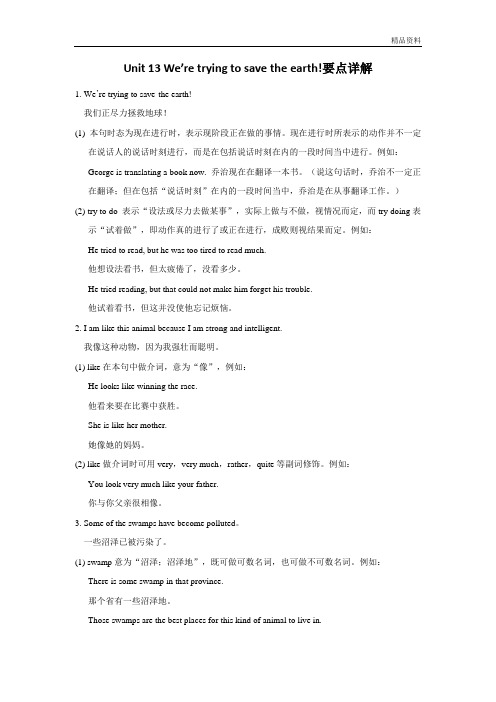
Unit 13 We’re trying to save the earth!要点详解1. We’re trying to save the earth!我们正尽力拯救地球!(1) 本句时态为现在进行时,表示现阶段正在做的事情。
现在进行时所表示的动作并不一定在说话人的说话时刻进行,而是在包括说话时刻在内的一段时间当中进行。
例如:George is translating a book now. 乔治现在在翻译一本书。
(说这句话时,乔治不一定正在翻译;但在包括“说话时刻”在内的一段时间当中,乔治是在从事翻译工作。
)(2) try to do 表示“设法或尽力去做某事”,实际上做与不做,视情况而定,而try doing表示“试着做”,即动作真的进行了或正在进行,成败则视结果而定。
例如:He tried to read, but he was too tired to read much.他想设法看书,但太疲倦了,没看多少。
He tried reading, but that could not make him forget his trouble.他试着看书,但这并没使他忘记烦恼。
2. I am like this animal because I am strong and intelligent.我像这种动物,因为我强壮而聪明。
(1) like在本句中做介词,意为“像”,例如:He looks like winning the race.他看来要在比赛中获胜。
She is like her mother.她像她的妈妈。
(2) like做介词时可用very,very much,rather,quite等副词修饰。
例如:You look very much like your father.你与你父亲很相像。
3. Some of the swamps have become polluted。
一些沼泽已被污染了。
九年级英语全册-Unit-13-We’re-trying-to-save-the-earth(第2课时)教案-(新版)人教新目标版
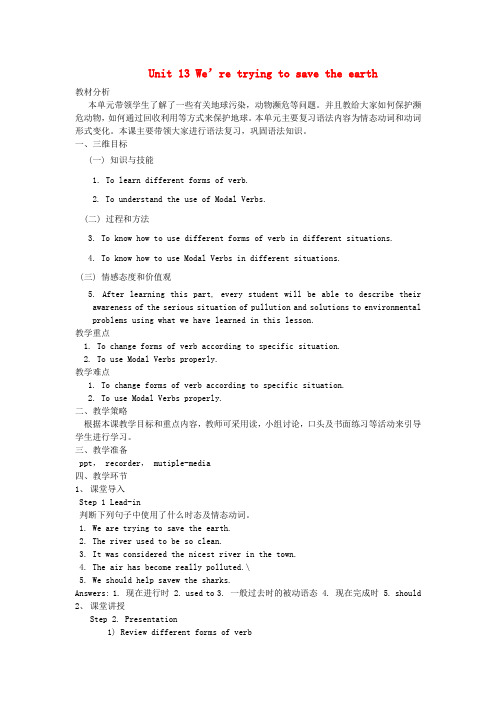
Unit 13 We’re trying to save the earth教材分析本单元带领学生了解了一些有关地球污染,动物濒危等问题。
并且教给大家如何保护濒危动物,如何通过回收利用等方式来保护地球。
本单元主要复习语法内容为情态动词和动词形式变化。
本课主要带领大家进行语法复习,巩固语法知识。
一、三维目标(一) 知识与技能1. To learn different forms of verb.2. To understand the use of Modal Verbs.(二) 过程和方法3. To know how to use different forms of verb in different situations.4. To know how to use Modal Verbs in different situations.(三) 情感态度和价值观5. After learning this part, every student will be able to describe theirawareness of the serious situation of pullution and solutions to environmental problems using what we have learned in this lesson.教学重点1. To change forms of verb according to specific situation.2. To use Modal Verbs properly.教学难点1. To change forms of verb according to specific situation.2. To use Modal Verbs properly.二、教学策略根据本课教学目标和重点内容,教师可采用读,小组讨论,口头及书面练习等活动来引导学生进行学习。
人教版新目标版九年级英语全册Unit 13 We’re trying to save the earth教案

Unit 13 We’re trying to save the earth!知识导航语言目标谈论污染和环境保护。
Section A 重点单词1. litter v.乱扔n.垃圾2. bottom n.底部3. coal n.煤4.ugly adj.丑陋的 5. cost v.花费n.花费 6. wooden adj.木制的 (wood n.木材) 7. plastic adj.塑料的n.塑料 8. method n.方法 9. cruel adj.残酷的 10. harmful adj.有害的 (harm n.害处) 11. industry n.工业 12. law n.法律 13. afford v.承担得起重点短语1.make a difference 起作用;有影响2. take part in 参加3. turnoff 关掉4. pay for 付费;付出代价5. cut down 减少6. lead to 导致7.hear of 听说 8. cut off 切除重点句型1.We’re trying to save the earth. 我们在努力拯救地球。
2. The rive used to be so clean. 这河流过去是如此的清澈。
3. The air is badly polluted. 空气被严重污染。
4. The method is not only cruel, but also harmful to theenvironment. 这种方法不仅残酷,而且对环境也有害。
Section B +Self Check 重点单词1. recycle v.回收利用2. gate n.大门3. bottle n.瓶子4.president n. 负责人 5. work n.作品 6. metal n.金属重点短语1. throw away 扔掉2. put sth. to good use 好好利用3. put …down 拆下 4. upside down 上下颠倒 5. bring back 恢复重点句型1. And the gate in front of her house is made of rocks and oldglass bottles. 她房子的前门是由岩石和旧玻璃瓶子制成的。
人教版九年级英语全册Unit13We'retryingtosavetheearth!优秀教学案例
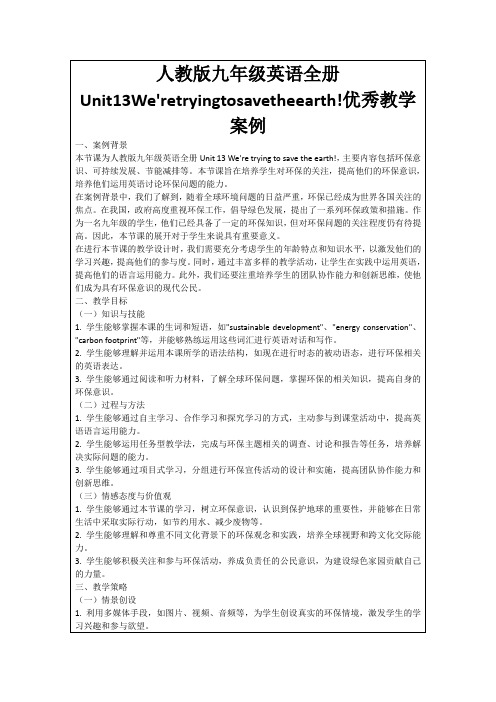
(三)情感态度与价值观
1.学生能够通过本节课的学习,树立环保意识,认识到保护地球的重要性,并能够在日常生活中采取实际行动,如节约用水、减少废物等。
2.学生能够理解和尊重不同文化背景下的环保观念和实践,培养全球视野和跨文化交际能力。
(四)反思与评价
1.教师引导学进行自我反思,评估自己在环保知识掌握和技能运用方面的进步,培养他们的自我监控和自我调整能力。
2.学生通过互评和小组评价,相互借鉴和学习,提高自己的环保意识和语言运用能力。
3.教师对学生的学习过程和成果进行综合评价,关注他们的全面发展,鼓励他们的创新和实践精神。同时,根据评价结果调整教学策略,提高教学效果。
2.学生通过完成作业,进一步巩固本节课所学内容,提高他们的语言运用能力。
3.教师对学生的作业进行评价,关注他们的全面发展,鼓励他们的创新和实践精神。同时,根据评价结果调整教学策略,提高教学效果。
五、案例亮点
1.创新的情景创设:本节课通过多媒体手段,如图片、视频等,为学生创设了丰富的环保情境,使学生身临其境地感受到环保问题的紧迫性。这种创新的情景创设方式不仅激发了学生的学习兴趣,而且提高了他们的参与度和学习效果。
四、教学内容与过程
(一)导入新课
1.教师通过展示一张地球的照片,引导学生关注地球的美丽和脆弱,引出本节课的主题——环保。
2.教师提问:“你们对环保有什么了解和看法?”让学生分享自己的知识和观点,激发他们的学习兴趣和参与欲望。
3.教师播放一段关于环保问题的新闻报道,让学生了解全球环保形势的严峻性,引出本节课的学习目标——提高环保意识,学习英语表达环保观点。
4.反思与评价的全面评估:教师引导学生进行自我反思,评估自己在环保知识掌握和技能运用方面的进步。同时,教师对学生的学习过程和成果进行综合评价,关注他们的全面发展。这种反思与评价的方式有助于培养学生的自我监控和自我调整能力,提高他们的批判性思维和创造性思维。
人教版英语九年级全册Unit13We'retryingtosavetheearth!优秀教学案例

4.对小组合作进行评价,关注学生的参与度、贡献度和团队合作效果。
(四)反思与评价
1.引导学生进行自我反思,思考自己在学习过程中的优点和不足,培养自我评价和自我改进的能力。
2.组织学生进行同伴评价,鼓励他们互相提供反馈和建议,培养评价能力和批判性思维。
3.创设问题情境,让学生面临真实的环保问题,如水资源浪费、垃圾分类等,引导学生主动思考和寻找解决方案。
4.利用多媒体技术,如视频、音频、动画等,营造生动有趣的学习氛围,激发学生的学习兴趣和积极性。
(二)问题导向
1.设计有挑战性的问题,引导学生深入思考环保问题的本质和影响。
2.通过提问和讨论,引导学生自主探究和解决问题,培养他们的批判性思维和问题境的影响。
3.总结本节课的主要内容和知识点,确保学生对环保知识有一个全面而准确的理解。
(五)作业小结
1.布置相关的作业,如研究报告、行动计划等,让学生将所学知识运用到实际生活中去。
2.要求学生在作业中提出自己的观点和解决方案,培养他们的创新思维和批判性思维能力。
3.引导学生关注环保问题的多样性和复杂性,培养他们的分析和综合能力。
4.鼓励学生提出自己的问题,激发他们的好奇心和探索精神。
(三)小组合作
1.组织学生进行小组讨论和合作,鼓励他们分享自己的观点和想法,培养合作能力和团队精神。
2.设计小组活动,如共同完成一篇关于环保的文章、策划一次环保活动等,让学生实际行动起来,提高实践能力。
3.鼓励学生在作业中积极表达自己的想法,注重培养他们的写作能力和表达能力。
4.对学生的作业进行认真批改和评价,提供及时的反馈和建议,帮助学生巩固所学知识,提高他们的学习效果。
人教版九年级英语全册Unit13We’retryingtosavetheearth!教学设计
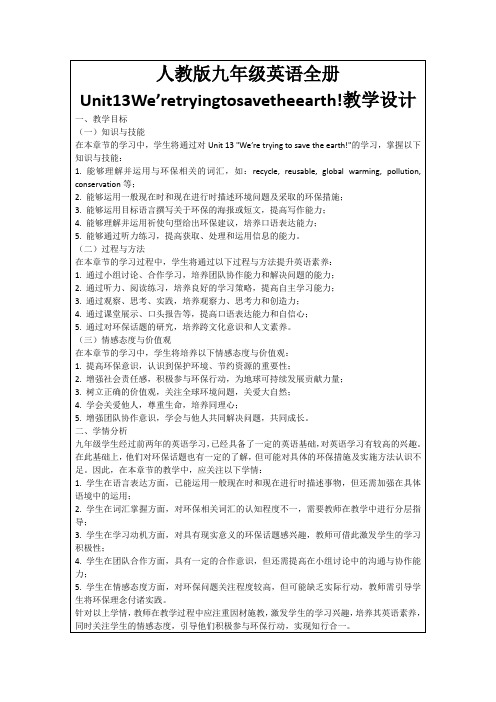
(3)海报制作:让学生分组制作环保海报,运用所学词汇和表达方式。
4.课后作业:
(1)要求学生撰写一篇关于环保的短文,巩固写作能力;
(2)鼓励学生参与环保活动,记录自己的行动和感受,提高实践能力。
5.评价与反馈:
(1)教师针对学生在课堂活动中的表现,给予及时、具体的评价;
-播放一段关于环保行动的听力材料,学生听后回答相关问题。
-教师引导学生总结听力材料中的关键信息,帮助学生提高获取、处理和运用信息的能力。
(三)学生小组讨论
1.教师将学生分成小组,每组选择一个环保主题,如:节约用水、减少塑料污染等。
2.小组内讨论以下问题:
- What are the main environmental problems related to your topic?
人教版九年级英语全册Unit13We’retryingtosavetheearth!教学设计
一、教学目标
(一)知识与技能
在本章节的学习中,学生将通过对Unit 13 "We’re trying to save the earth!"的学习,掌握以下知识与技能:
1.能够理解并运用与环保相关的词汇,如:recycle, reusable, global warming, pollution, conservation等;
1.完成课本练习册中与本课相关的练习题,特别是词汇填空、语法填空和听力练习,以加深对环保词汇和语法的掌握。
2.结合课堂所学,制作一份关于环保的海报,内容包括:环保主题、现状介绍、具体措施和建议。要求设计新颖,语言表达清晰,图文并茂。
3.撰写一篇短文,以“我的环保行动”为主题,描述自己在日常生活中实施的环保措施,以及对环保的认识和体会。字数在100-120词左右,要求使用一般现在时和现在进行时描述。
人教版(新目标)英语九年级下册《Unit 13 We're trying to save the earth!》单元话题阅读与写作课件

vegetables
from their own garden.
★ The pupils bring both their books and their
(3)_r_u_b_b_i_s_h_to school.
Recycling ★ The pupil who works hardest at recycling will
(4)_g_e_t_/_r_e_c_ei_v_e__a_p__ri_z_e_from the teachers.
Finding cleaner ★ Fairfield School asks teachers and students not
ways to get to go to school (5)__b_y__c_a_r_.
根据短文内容,完成表格中的有关信息。
Ways How to (1)___p_r_o_t_e_c_t_t_h_e_e_n__v_ir_o_n_m__e_n_t___
★ Pupils at Fairfield School can enjoy delicious
Growing
food by growing and (2)_p__ic_k_i_n_g__vegetables
3. water pollution:___w__a_s_h_in_g__c_lo_t_h_e_s_i_n_t_h_e__ri_v_e_r_, ____ __l_it_t_er_i_n_g_i_n__th_e__r_iv_e_r_, _w_a_s_t_e_w__a_te_r_f_r_o_m__f_a_c_to_r_i_e_s___
_N__o_w__I_w__a_n_t _t_o_t_a_lk__a_b_o_u_t_t_h_e_a_i_r_p_o_l_l_u_ti_o_n_.___________
UNIT13Weretryingtosavetheearth原文与翻译

UNIT13We'retryingtosavetheearth原文与翻译《牛津初中英语》充分体现了《新课标》的诸多精神。
该教材具有两大特点。
下面是小偏整理的UNIT13We'retryingtosavetheearth 原文与翻译,感谢您的每一次阅读。
UNIT13We'retryingtosavetheearth原文与翻译SectionA1bListenandcompletethesentences.Tony:Hey,Mark,maybewecouldgoswimmingintheriverlaterthi safternoon.Mark:Idon’tthinkIwanttogo,Tony.Tony:Whynot?Mark:Iwastherelastweekendandtheriverwasreallydirty.Eventh ebottomoftheriverwasfullofrubbish,andtherewerenomorefishforf ishermentocatch.Tony:Noway!Itusedtobesoclean.Infact,ithasalwaysbeentheni cestriverinthistown.Mark:Notanymore.Ithinkpeoplearethrowinglitterintotheriver. Factoriesarealsoputtingwasteintotheriver.Tony:That’sterrible!Weshouldwritetothegovernment.Theys houldclosedownthefactories.Mark:Goodidea!ButIthinkeveryoneinthistownshouldhelptocl eanuptheriver,too.Everyoneshouldplayapart,notjustthegovernm entSectionA2aListentotheinterview.thekindsofpollutionthatJasonandSusan talkabout.Interviewer:T odaywe’retalkingtoJason andSusanaboutenvir onmentalproblems.JasonandSusan,canyoutellusaboutsomeofth eproblemsyou’veseen?Jason:Ithinkoneproblemisthattheairisbadlypolluted.Ihardlye verseeblueskiesanymore.Susan:Yes,andIusedtoseethestarsclearly.Interviewer:Whatdoyouthinkhascausedthisproblem?Susan:Well,therearemorecarsontheroadthesedays.Jason:Andfactoriesthatburncoalalsopollutetheairwithalotofb lacksmoke.Interviewer:Whatotherproblemsdoyousee?Susan:Iguessthere’stoomuchrubbishandwasteinthestreets.Jason:Yes!Everydaypeoplearethrowingawaythingslikewoode nchopsticks,plasticbowlsandplasticbags.Susan:They’realsolitteringinpublicplaces,forexample,durin gpicnicsinparks.Thisisturningbeautifulplacesintouglyones.Interviewer:You’reright.Theseareseriousproble msforourenv ironment.Next,let’stalkaboutthethingswecandotohelp.SectionA2bListenagainandcompletethesentences.Interviewer:T odaywe’retalkingtoJasonandSusanaboutenvir onmentalproblems.JasonandSusan,canyoutellusaboutsomeofth eproblemsyou’veseen?Jason:Ithinkoneproblemisthattheairisbadlypolluted.Ihardlye verseeblueskiesanymore.Susan:Yes,andIusedtoseethestarsclearly.Interviewer:Whatdoyouthinkhascausedthisproblem?Susan:Well,therearemorecarsontheroadthesedays.Jason:Andfactoriesthatburncoalalsopollutetheairwithalotofb lacksmoke.Interviewer:Whatotherproblemsdoyousee?Susan:Iguessthere’stoomuchrubbishandwasteinthestreets.Jason:Yes!Everydaypeoplearethrowingawaythingslikewoodenchopsticks,plasticbowlsandplasticbags.Susan:They’realsolitteringinpublicplaces,forexample,d urin gpicnicsinparks.Thisisturningbeautifulplacesintouglyones.Interviewer:You’reright.Theseareseriousproblemsforourenv ironment.Next,let’stalkaboutthethingswecandotohelp.SectionA2dRoleplaytheconversation.JasonandSusan,whatareyourideasforsolvingtheseproblems?Well,tocutdownairpollution,weshouldtakethebusorsubwayin steadofdriving.Yeah,orrideabike.Thereareotheradvantagesofbikeriding.It'sg oodforhealthitdoesn'tanythingGreatideas!Whataboutwastepollution?Mmm,Ithinksimplethingslikebringingabagtogoshoppingcan help.Istarteddoingthatayearago.Me,tooAlso,Inevertakewoodenchopsticksorplasticforkswhen Ibuytakeawayfood.Iusetheonesathome.Andremembertothrowrubbishinthebinsandkeeppublicplace scleanandbeautifulforeveryone.Sotogether,ouractionscanmakeadifferenceandleadtoabetter future!SectionA3aReadthepassageaboutsharksandcompletethefactsheetbelow.SavetheSharks!Manyhaveheardofsharkfinsoup.Thisfamousandexpensivedis hisespeciallypopularinsouthernChina.Butdoyourealizethaty ou’r ekillingawholesharkeachtimeyouenjoyabowlofsharkfinsoup?Whenpeoplecatchsharks,theycutofftheirfinsandthrowthesha rkbackintotheocean.Thisisnotonlycruel,butalsoharmfultotheenvir onment.Withoutafin,asharkcannolongerswimandslowlydies.Sharksar eatthetopofthefo odchainintheocean’secosystem.Iftheirnumber sdroptoolow,itwillbringdangertoalloceanlife.Manybelievethatsharkscanneverbeendangeredbecausethey arethestrongestintheirfoodchain.Butinfact,around70millionshark sarecaughtandtradedinthisindustryeveryyear.Thenumbersofsomekindsofsharkshavefallenbyover90percen tinthelast20to30years.Environmentalprotectiongroupsaroundthe world,suchasWildAidandtheWWF,areteachingthepublicabout“fi nning”.Theyhaveevenaskedgovernmentstodeveloplawstostopthesal eofsharkfins.Sofar,noscientificstudieshaveshownthatsharkfinsare goodforhealth,sowhyeatthem?Helpsavethesharks!SectionB1cListenandcheck(√)thethingsthatJuliaandJacktalkabout.Jack:Turnoffthelights,Julia.Itsaveselectricity.Julia:Oh,Iusuallydothat.Iwasjustinahurry.Jack:Isee.I’vejustreadabookwh ichgivesideasabouthowweca nsavetheenvironment.Forexample,youshouldturnofftheshowerw henyou’rewashingyourhair.Julia:Oh,Iwouldneverdothat.Ihaveveryshorthair.Itonlytakesaf ewminutestowash.Whatelsedoesitsay?Jack:Youshouldtakeyourownbagswhenyougoshopping.Julia:Oh,that’seasy.I’lldothatfromnowon.Whatelse?Jack:Peopleshouldstopridingincarsandstartridingbikes.Julia:Noway!Itwouldtakeme45minutestogettoschoolbybike!Jack:Butit’sgoodfortheenvironment!Besides,Ilikeridingmybi ke.Julia:Yes,andyoualsoliveclosetoschool!SectionB1dListenagain.Check(√)thethingsthatJuliaisdoingnow,thethings shewilldointhefutureandthethingsshewouldneverdo.Jack:Turnoffthelights,Julia.Itsaveselectricity.Julia:Oh,Iusuallydothat.Iwasjustinahurry.Jack:Isee.I’vejustreadabookwhichgiveside asabouthowweca nsavetheenvironment.Forexample,youshouldturnofftheshowerw henyou’rewashingyourhair.Julia:Oh,Iwouldneverdothat.Ihaveveryshorthair.Itonlytakesaf ewminutestowash.Whatelsedoesitsay?Jack:Youshouldtakeyourownbagswhenyougoshopping.Julia:Oh,that’seasy.I’lldothatfromnowon.Whatelse?Jack:Peopleshouldstopridingincarsandstartridingbikes.Julia:Noway!Itwouldtakeme45minutestogettoschoolbybike!Jack:Butit’sgoodfortheenvironment!Besides,Ilikeridingmybi ke.Julia:Yes,andyoualsoliveclosetoschool!SectionB2bReadthepassageandcompletethechartbelow.Rethink,Reuse,Recycle!Doyouoftenthrowawaythingsyoudon’tneedanymore?Have youeverthoughtabouthowthesethingscanactuallybeputtogoodu se?Nothingisawasteifyouhaveacreativemind.Youhaveprobablyn everheardofAmyHayes,butsheisamostunusualwoman.Shelivesin ahouseintheUKthatshebuiltherselfoutofrubbish.Thewindowsanddoorscomefromoldbuildingsaroundhertow nthatwerepulleddown.Thetopofthehouseisanoldboatturnedupsi dedown.Andthegateinfrontofherhouseismadeofrocksandoldglas sbottles.AmyrecentlywonaprizefromtheHelpSaveOurPlanetSociety.Thepresidentsaid,“Amyisaninspirationtousall.”Amyisn’ttheonlyonewhoisgoodatrecycling.JessicaWongfro mHongKongusesoldclothesthatpeop ledon’twearanymoretoma kebags.Shehasbeendoingthisforafewyearsnow.Sheopenedasmallshopwhereshesellsherbags,andshehasalso setupawebsitetosellthemonline.Sheespeciallylikestouseoldjeanst omakehandbags.Herbagsarecuteanduseful.“Iplantowriteabookaboutnewwaystouseoldclothes,”shesai d.“Ihopepeoplecanreadmybookandenjoyit!”WangTaosetupasmallbusinessinShanghaifouryearsago.Heisk nownforusingironandothermaterialsfromoldcarstomakebeautifu lartpieces.Somearelargepiecesthatlooklikeanimalsorhumans,and somearesmallerpiecesyoucanputathome.Themorepopularworks canevenbeseeninartshopsaroundthecity.WangTaohopestosetupa“metalart”themeparktoshowpeop letheimportanceofenvironmentalprotection.Notonlycantheartbri nghappinesstoothers,butitalsoshowsthatevencold,hardironcanb ebroughtbacktolifewithalittlecreativity.翻译:SectionA2d采访者:贾森和苏珊,对于解决这些问题,你们有什么想法?贾森:为了减少空气污染,我们应该乘坐公共汽车或者地铁,而不是开车。
人教版英语九年级全册Unit13We’retryingtosavetheearth!大单元教学设计
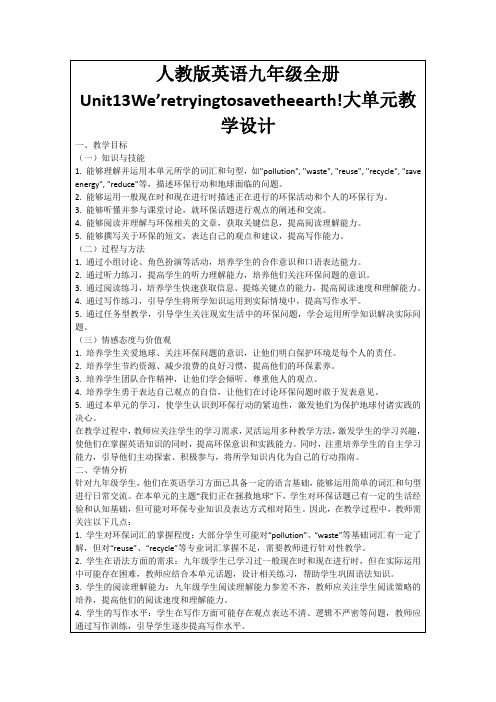
3.通过讨论,教师引入本单元的主题:“We’re trying to save the earth!”(我们正在尝试拯救地球),并简要介绍本节课的学习目标。
6.拓展延伸:鼓励学生在课后进行环保主题的研究,如调查身边的环保行为、采访环保人士等,将学习延伸到课堂之外。
四、教学内容与过程
(一)导入新课
在这一阶段,教师将采用多媒体资源和生活实例来导入新课,激发学生的学习兴趣和参与热情。
1.教师展示一系列关于地球环境问题的图片和视频,如森林砍伐、海洋污染、空气污染等,引导学生关注这些问题的严重性。
教学设想:通过词汇卡片、小组竞赛、情景剧等形式,让学生在实际语境中反复练习,加深记忆。
2.语法运用:现在进行时在描述正在进行的环保活动中的应用,以及一般现在时在陈述环保事实和习惯中的应用。
教学设想:设计语法练习,如填空、改错、句型转换等,帮助学生掌握语法规则,并通过真实的语境任务进行巩固。
3.阅读理解:提取文章主旨,理解作者观点,分析环保问题的原因和解决方案。
4.写作任务:请学生撰写一篇关于“我如何为地球环境保护做贡献”的短文,要求他们运用课堂所学的写作技巧,表达自己的观点和建议。
5.环保实践:鼓励学生在家中或学校进行一项环保实践活动,如回收废旧物品、节约用水用电等,并记录下来,在下一节课与同学分享。
6.家庭作业:布置一份综合性的家庭作业,结合本单元所学内容,要求学生观察并记录身边的环保行为,采访家人或朋友对环保的看法,整理成一篇小报告。
在教学过程中,教师应充分了解学生的学情,结合他们的需求和兴趣,设计有针对性的教学活动,激发学生的学习兴趣,提高他们的英语素养和环保意识。
新目标九年级英语全册Unit13《We’retryingtosavethe···》微课精讲+知识点习题
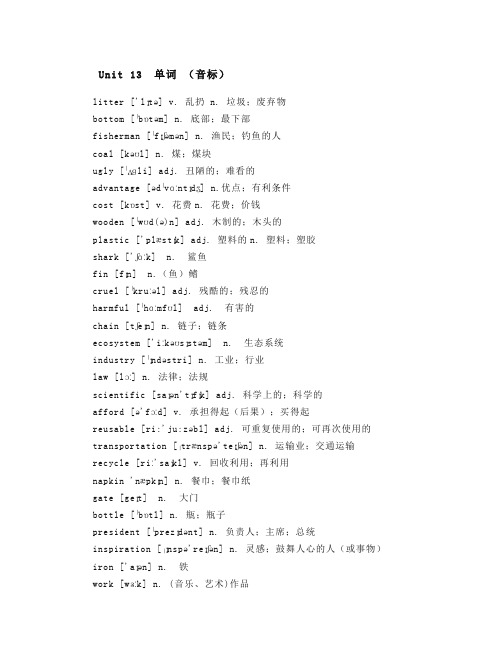
Unit 13 单词(音标)litter ['lɪtə] v. 乱扔 n. 垃圾;废弃物bottom [ˈbɒtəm] n. 底部;最下部fisherman [ˈfɪʃəmən] n. 渔民;钓鱼的人coal [kəʊl] n. 煤;煤块ugly [ˈʌɡli] adj. 丑陋的;难看的advantage [ədˈvɑːntɪdʒ] n.优点;有利条件cost [kɒst] v. 花费n. 花费;价钱wooden [ˈwʊd(ə)n] adj. 木制的;木头的plastic ['plæs tɪk] adj. 塑料的n. 塑料;塑胶shark ['ʃɑːk] n. 鲨鱼fin [fɪn] n.(鱼)鳍cruel [ˈkruːəl] adj. 残酷的;残忍的harmful [ˈhɑːmfʊl] adj. 有害的chain [tʃeɪn] n. 链子;链条ecosystem ['iːkəʊsɪstəm] n. 生态系统industry [ˈɪndəstri] n. 工业;行业law [lɔː] n. 法律;法规scientific [saɪən'tɪfɪk] adj. 科学上的;科学的afford [ə'fɔːd] v. 承担得起(后果);买得起reusable [ri:'ju:zəbl] adj. 可重复使用的;可再次使用的transportation [ˌtrænspə'teɪʃən] n. 运输业;交通运输recycle [riː'saɪkl] v. 回收利用;再利用napkin 'næpkɪn] n. 餐巾;餐巾纸gate [geɪt] n. 大门bottle [ˈbɒtl] n. 瓶;瓶子president [ˈprezɪdənt] n. 负责人;主席;总统inspiration [ˌɪnspə'reɪʃən] n. 灵感;鼓舞人心的人(或事物)iron ['aɪən] n. 铁work [wɜːk] n. (音乐、艺术)作品metal ['metl] n. 金属creativity [ˌkriːeɪ'tɪvɪtɪ] n. 创造力;独创性知识点汇总第十三单元知识点汇总(供课前预习课后复习)【重点短语】1. at the bottom of the river 在河底2. be full of rubbish 充满垃圾3. throw litter into the river 把垃圾扔入河中4. play a part in cleaning it up 尽一份力把它清理干净5. land pollution 土地污染6. fill the air with black smoke 使空气中充满了黑烟7. cut down air pollution 减少空气污染8. make a difference 产生影响9. take action 采取行动10. turn off 关掉11. pay for 付费12. add up 累加13. use public transportation 使用公共交通14. recycle books and paper 回收书和纸15. use paper napkins 使用纸巾16. turn off the shower 关掉淋浴器17. ride in cars 开车出行18. cut off 割掉;砍掉19. upside down 颠倒;倒转【重点句子】1. Even the bottom of the river was full of rubbish.甚至河底都充满了垃圾。
人教版新目标英语九年级(全一册)Unit 13《We're trying to save the earth》短语及测试题(含答案)

Unit 13 We’re trying to save the earth!知识点和练习Phrases 1.noise/ air/ water pollution 噪音/ 空气/ 水污染the bottom of .......的底部be full of rubbish 装满垃圾 2.throw litter into the river 把垃圾扔进河里 3. put waste into the river 把废品放进河里4.write to sb. 给某人写信5. close down (工厂)关闭/ 使停业turn off 关闭(电源)6. clean up 打扫干净7. Play a part in在......方面起作用8. on the road 在路上9. burn coal烧煤10. pollute the air污染空气11. a lot of black smoke 许多黑烟12. throw away 扔掉;抛弃throw away things扔掉/抛弃东西13. in public places 在公共场所14. turn into变成turn A into B 把A变成B 15. solve the problems 解决问题16. cut down 减少,砍伐(树木)cut up 切碎cut off 切除,切掉,切断17. ride a bike 骑自行车18.the advantage(s) of ......的优点19. be good for (反义:be bad for )对......有益20. waste pollution 废品污染too much waste太多的废物21. bring a bag to go shopping 带购物袋22. wooden chopsticks 木筷子23.plastic forks 塑料叉子24. buy takeaway food 买外卖食物25. make a difference to sb./ sth. 对某人/ 某物有影响/ 起作用26. lead to a better future 引向一个更好的未来lead to 通向;导致27.take part in+ 具体的活动=join in + 具体的活动参加28.hear of/about 听说hear from sb.收到某人的来信29. in southern China 在中国南部30. a bowl of shark fin soup一碗鱼翅汤31. kill a whole shark 杀一整只鲨鱼32. each time每次33. not only ... but also ... 不仅......而且...... (并列作主语时,谓语动词采用就近原则;not only 位于句首时,它后面的主谓采用部分倒装,但but also后面的主谓不倒装)34.be cruel 残忍的35. be harmful to = be bad for 对......有害be harmful to the environment 对环境有害36.throw back into 扔回at the top of 在......顶部37. the food chain 食物链38. in the ocean’s ecosystem 在海洋生态系统中39. drop too low 下降太多40. bring danger to sb. 给某人带来危险41. be endangered 濒临灭绝的42. in fact 实际上43. in this industry 在这个行业里44. be traded 被贸易44. the number of+pl ......的数量(作主语时,谓语动词用单数形式)a number of+pl 许多(作主语时,谓语动词用复数形式)45.fall by 下降46.in the last / past +时间段在过去的...... (是现在完成时的标志)47.environmental protection groups 环保组织48. teach the public 教育公众49. develop the law形成法律50. stop the sale of shark fins 阻止鲨鱼鱼鳍的销售51. so far 到目前为止52. be in danger处于危险中53. scientific studies 科学研究54.consider doing sth. 考虑做某事55. help out帮助解决困难56.improve the environment 改善环境57. ( can/ can’t /couldn’t ) afford to do sth . 能/不能承担做某事58. take action 采取行动59.save electricity节约电60. pay for 付费61. add up 累计/累加62. improve the environment 改善环境63. use public transportation 使用公共交通运输64. parents with children 带孩子的父母65.stop riding in cars 停止开车66. recycle books and paper 回收书和纸67. turn off the shower 关掉淋浴器68. wash one’s hair 洗头发69. use paper napkins 用餐巾纸70. put sth. to good use 好好利用某物71. have a creative mind 有一个充满创意的头脑72. a most / very unusual woman一个非常不寻常的妇女the most unusual woman最不寻常的妇女73. build/ make sth. out of sth. 用某物修建/制造某物make a kite out of paper 用纸制作一只风筝74. pull down 拆下;摧毁75.upside down 上下颠倒,倒转turn upside down 翻转turned upside down 被翻转过来的76.win a prize获奖77. the Help Save Our Planet Society帮助拯救我们的星球协会78. be an inspiration to sb. 对某人是一种激励79.be good at = do well in擅长于80. use sth. to do sth. 用某物做某事81.open a small shop开一个小商店82. set up a website建立一个网站82. plan to do计划做某事83. set up a small business 经营一个小生意83.be known for+原因= be famous for+原因因......而出名be known as+职业= be famous as+职业作为......而出名84. make beautiful art pieces制作漂亮的艺术作品85. set up a theme park建立一个主题公园86.the importance of.... .......的重要性86. bring happiness to sb.把快乐带给某人87. bring back to life 使恢复生机/ 生命/ 使.......苏醒综合测试题一单项选择题()1.I don't think you've been to Disneyland, ________?A.aren't you B.haven't you C.do you D.have you()2.The villager built the bridge ________stones last year.A.out of B.out C.to D.for()3.My brother watched the football match instead of ________ his homework.A.doing B.do C.did D.does()4.—Do you know the movie Harry Potter? —Yes.I________ it twice.It's funny.A.saw B.see C.have seen D.will see()5.More natural protection areas should ________ in the future.A.set up B.to set up C.be set up D.setting up()6.—Do you like playing computer games? —No, but I ________.A.used to B.didn't C.do D.don't()7.I have never________ the strange animal before.A.heard from B.Listened C.listened to D.heard of()8.—Miss Liu, when did you come here?—In 2012.I________ here for two years.A.have been to B.have gone to C.have come D.have been()9.Lots of food and water___to Ya'an, Sichuan Province immediately after the earthquake happened.A.were sent B.are sent C.send D.sent()10.The children were hungry and the salad was quickly________ up.A.eating B.ate C.eaten D.eat()11.Look, so many passengers________ with their smart phones on the underground.A.played B.will play C.are playing D.have played()12.Great changes________ in Daqing since the 1990s.A.took place B.were taken place C.have taken place D.have been taken place ()13.—How much does the car________?—Oh, that's not too dear.It's only 100,000 yuan.A.spend B.cost C.take D.pay()14.—Have you________ the school sports meeting? —Yes, I have.A.take part B.taken part C.taken part in D.took part in()15.—What________ I do? —You'll________ study from now on if you want to go to college.A.can; may B.should; can C.should; have to D.may; could()16.________ he ________ on well with his friends this term?A.Did; get B.Does; get C.is; gotten D.Is; getting()17.Our teacher told us waste bottles should be________ good use.A.put B.put to C.to put D.puts()18.—John, your room is really in a mess.It needs________. —Sorry, Mum.I'll do it at once.A.cleans B.cleaned C.to clean D.to be cleaned()19.It’s time ______ him_____ up. Or he will be late for school.A. Of, to getB. for, to getC. Of, gettingD. for , getting()20.The are so many good restaurants. I can’t decide _____ ?A. what to eatB. how to eatC. where to eatD. when to eat二、完形填空Nancy's grandma lived in a big old house in New York.Nancy and her parents went to see her each summer.Nancy __21__ to see Grandma and bake (烘烤) with her.She liked to play cards with her, too.This summer, however, Grandma did not seem __22__.She seemed to be worried about something.“Wh at's wrong with Grandma?” Nancy asked her mom.“The __23__ pollution is bothering (使烦恼) her,” Mom said.“Do you _24__ the noise from all those cars?” Nancy asked.“Yes,” Mom said.“When Grandma moved here many years ago, there wasn't such a big _25_ here.Now there is a big road that is used to go to work easily in the city.Big trucks deliver (运载) food all over, too, by __26__ this road.They make so much noise.The noise pollution really bothers Grandma.”“I know _27__ water pollution and air pollution are.I learned about them in school, but what is noise pollution?” Nancy asked.“Pollution is __28__ that is bad for you,” Mom said.“Noise pollution can influence someone's __29__.Grandma's blood pressure goes up because of too much noise.She also has trouble __30__ with all the traffic at night.Grandma's hearing has been hurt by the noise, too.”()21.A.loved B.hated C.wanted D.feared()22.A.interesting B.Happy C.healthy D.well()23.A.water B.soil C.air D.noise()24.A.mean B.get C.tell D.point()25.A.factory B.pool C.road D.railway()26.A.cleaning B.using C.building D.making()27.A.what B.how C.where D.when()28.A.everything B.anything C.something D.nothing()29.A.diet B.habits C.health D.feelings()30.A.listening B.sleeping C.walking D.thinking三、阅读理解A large part of China experienced larger amounts of smog (雾霾) than usual and the air was badly polluted.The distance one could see was shorter than 1,000 meters in Beijing, Tianjin, and the provinces of Hebei, Henan, Shandong and Anhui.In some areas, it was down to 200 meters.People usually set off firecrackers (爆竹) to celebrate the Spring Festival.But because of the smog, this year seemed very quiet.It was really different.A man called Zhang Wei said that his friends and he hadn't set off a single firecracker.“We all suffered from last month's smog.If we don't call an end to the firecrackers, the environment will get worse and worse during t he holiday.” Said Zhang Wei.He called on more people to set off fewer firecrackers during this year's Spring Festival holiday by putting up a notice in his neighborhood.More Chinese looked forward to celebrating the holiday in a greener way.They decided not to set off firecrackers.They also decided not to waste food.They said that the new celebrations sounded fashionable.To clean the sky, more than ten provinces including Guangdong, Zhejiang and Jiangsu have started to use national 4 standard (标准), which is expected to reduce (减少) vehicle emission (车辆排放) by 30% to 50%.Beijing even has started to use the stricter national 5 standard.We still have a lot to do to improve the air quality.For example, using public transportation as much as possible is not a hard thing for us to do, but it matters a lot.()31.What happened in a large part of China this January?A.It experienced larger amounts of smog. B.People set off lots of firecrackers.C.There was a heavy rain. D.Many car accidents happened.()32.How do people usually celebrate the Spring Festival in China?A.By putting up a notice B.By setting off firecrackers.C.By not wasting food. D.By using public transportation.()33.How many provinces have started to use national 4 standard?A.Three. B.Six. C.Eight. D.More than ten.()34.Which of the following is NOT true according to the passage?A.Zhang Wei didn't set off a single firecracker this Spring Festival.B.We should use more public transportation to help reduce the air pollution.C.Zhejiang has started to use national 4 standard to reduce vehicle emission.D.More Chinese think the celebration of setting off firecracker is fashionable.()35.What's the best title for the passage?A.How to Reduce the Vehicle Emission B.How to Improve the Air QualityC.What Do Chinese Do in the Spring Festival D.Using Public Transportation四、首字母填空Travel can teach kids more than a textbook. Travelling with kids is good f 1 them. They can find new interests. Travel makes information alive for kids, and makes it much more exciting than studying textbooks or d 2 experiments in the lab. While traveling, they learn h 3 to deal with new situations, and communicate with other people. They learn patience, because sometimes i 4 takes a long time to get to some exciting or interesting places.I’ve been traveling since I was seven years old. For me, to stop traveling would be like taking something a 5 from my soul(灵魂). I can’t live without traveling and I wouldn’t be who I am if I don’t travel. Some people think it’s h 6 to travel after having kids. But in my opinion, when people become parents, it doesn’t m7 they couldn’t travel any more. My children have been traveling since they were three weeks old.Bringing a new life into the world comes with many responsibilities(责任)and I’d love to be a good mother. One of my duties is to e 8 my children. I’m so thankful that my parents took me on family trips when I was y 9 .I’ve learned that the outside world is more colorfu l than the little one I was living in. Of course, I want to pass these travel e 10 on to my children.I value the memories I have traveling with my children. I’m sure they will always remember them in their lives.1. 2. 3. 4. 5.6. 7. 8. 9. 10.1When his friend Bob saw him, he laughed and said, "What has 2 to your hair, Jack?"Jack said, "I tried a new barber's shop today, because I wasn't quite satisfied(满意的) with my 3 one, but this one seems even 4 ."Bob agreed. "Yes, I think you're right, Jack. Now I'll tell you 5 to do when you go into a barber's shop next time: look at all the barber's hair, find out 6 hair looks worst, and then go straight to him.""Why shall I go to him?" Jack asked. "But that would be foolish!""Oh, no, it wouldn't," answered Bob. "Who 7 that man's hair? Just think it. He couldn't cut it 8 , could he? Another of the barbers cut it. So you know he can't be the worst barber."1. 2. 3. 4. 5. 6. 7. 8.六.书面表达我们知道,由于环境污染、人类的残杀,很多野生动物濒临灭绝。
人教版英语九年级全册unit13We’retryingtosavetheearth
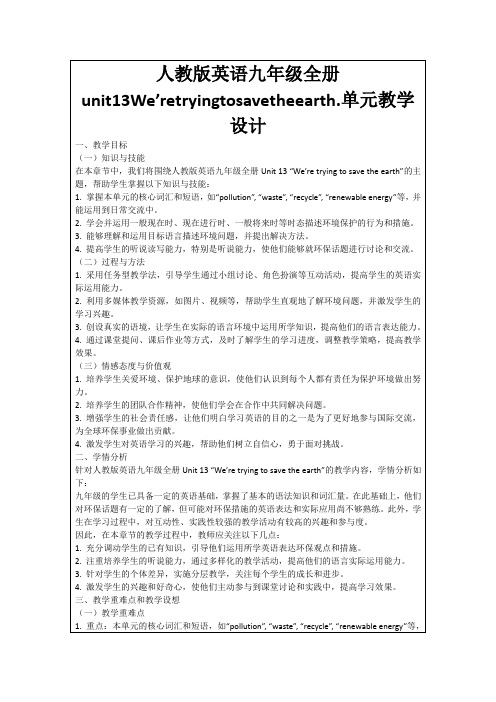
设计意图:通过图片展示,让学生直观地感受到环境问题的严重性,为新课的学习做好情感铺垫。
2.教学活动:教师引导学生讨论以下问题:What do you see in these pictures? How do you feel about it? Do you think it's important to protect the environment?
2.培养学生的团队合作精神,使他们学会在合作中共同解决问题。
3.增强学生的社会责任感,让他们明白学习英语的目的之一是为了更好地参与国际交流,为全球环保事业做出贡献。
4.激发学生对英语学习的兴趣,帮助他们树立自信心,勇于面对挑战。
二、学情分析
针对人教版英语九年级全册Unit 13 “We’re trying to save the earth”的教学内容,学情分析如下:
人教版英语九年级全册unit13We’retryingtosavet
在本章节中,我们将围绕人教版英语九年级全册Unit 13 “We’re trying to save the earth”的主题,帮助学生掌握以下知识与技能:
1.掌握本单元的核心词汇和短语,如“pollution”, “waste”, “recycle”, “renewable energy”等,并能运用到日常交流中。
设计意图:激发学生的创作兴趣,提高他们的审美和动手能力。
设计意图:锻炼学生的书面表达能力,使他们能够运用所学知识阐述自己的观点。
2.口语作业:学生以小组为单位,录制一段关于环保的对话或访谈,讨论如何在学校或家庭中实施环保措施。要求每个成员都有发言机会,对话中需包含本节课所学的词汇和时态。
人教版九年级英语全册Unit13We’retryingtosavetheearth!优秀教学案例

3.学生能够理解课文内容,把握文章结构和主旨,提高他们的阅读理解能力。
4.学生能够通过模仿、角色扮演等方式,运用本课所学知识进行情景交际,提高他们的口语表达能力。
(二)过程与方法
1.学生通过自主学习、合作探讨等方式,分析课文内容,提高他们的自主学习能力和合作精神。
2.教师批改作业,了解学生的学习情况,对学生的进步给予肯定和鼓励,对需要改进的地方提出建议和指导。
3.学生根据教师的反馈,进行自我反思,调整学习方法,不断提高自己的学习效果。
五、案例亮点
1.情景创设:通过播放环保主题的视频和图片,让学生直观地感受到环境问题的严重性,激发他们的学习兴趣和环保意识。这种情景创设的方式不仅有助于吸引学生的注意力,而且能够使学生更加关注环保问题,从而提高他们的学习积极性和参与度。
2.问题导向:设计一系列与课文内容相关的问题,引导学生通过阅读、讨论等方式寻找答案,提高他们的阅读理解和思维能力。问题导向的教学策略有助于培养学生的批判性思维和问题解决能力,使他们在解决问题的过程中更好地理解和掌握知识。
3.小组合作:将学生分成小组,让他们共同完成环保主题的项目,如设计环保标语、制作环保宣传册等。小组合作的方式有助于培养学生的团队合作能力和创新精神,同时也能够提高他们的口语表达能力和交际技巧。
2.设计环保主题的场景,让学生参与其中,如模拟垃圾分类、能源节约等,让学生在实际操作中学习环保知识。
3.创设问题情境,让学生思考环保与生活的关系,如“你觉得我们应该如何减少塑料污染?”等,引导学生主动探索答案。
(二)问题导向
1.设计一系列与课文内容相关的问题,引导学生通过阅读、讨论等方式寻找答案,提高他们的阅读理解和思维能力。
人教版英语九年级全一册Unit 13听力原文及翻译
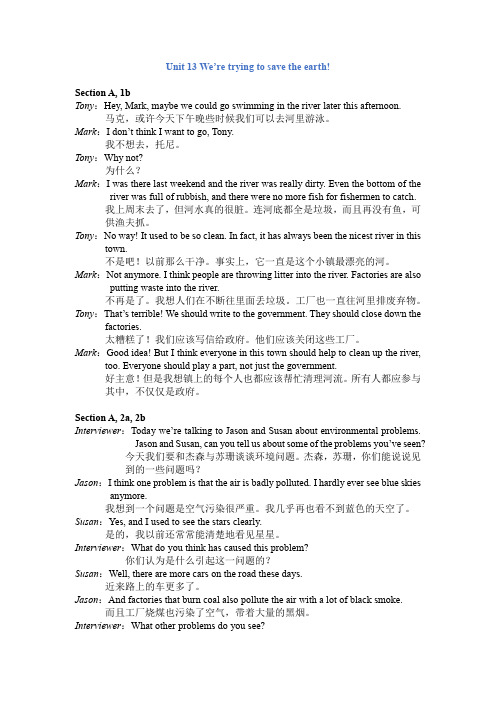
Unit 13 We’re trying to save the earth!Section A, 1bTony:Hey, Mark, maybe we could go swimming in the river later this afternoon.马克,或许今天下午晚些时候我们可以去河里游泳。
Mark:I don’t think I want to go, Tony.我不想去,托尼。
Tony:Why not?为什么?Mark:I was there last weekend and the river was really dirty. Even the bottom of the river was full of rubbish, and there were no more fish for fishermen to catch.我上周末去了,但河水真的很脏。
连河底都全是垃圾,而且再没有鱼,可供渔夫抓。
Tony:No way! It used to be so clean. In fact, it has always been the nicest river in this town.不是吧!以前那么干净。
事实上,它一直是这个小镇最漂亮的河。
Mark:Not anymore. I think people are throwing litter into the river. Factories are also putting waste into the river.不再是了。
我想人们在不断往里面丢垃圾。
工厂也一直往河里排废弃物。
Tony:That’s terrible! We should write to the government. They should close down the factories.太糟糕了!我们应该写信给政府。
他们应该关闭这些工厂。
Mark:Good idea! But I think everyone in this town should help to clean up the river, too. Everyone should play a part, not just the government.好主意!但是我想镇上的每个人也都应该帮忙清理河流。
人教版英语九年级Unit13《We’retryingtosavetheearth》全单元说课稿
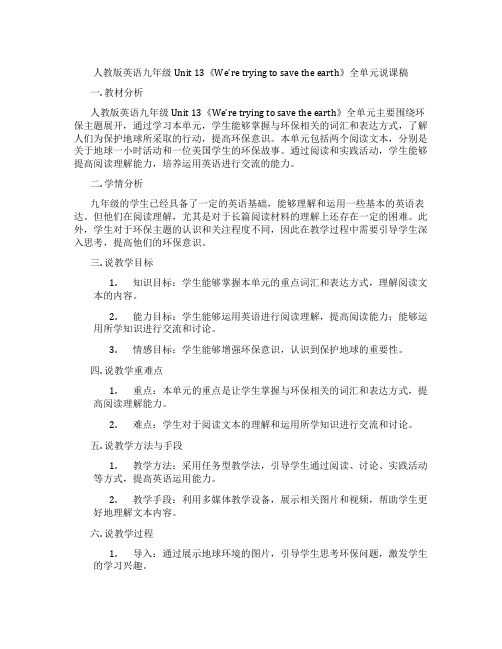
人教版英语九年级Unit 13《We’re trying to save the earth》全单元说课稿一. 教材分析人教版英语九年级Unit 13《We’re trying to save the earth》全单元主要围绕环保主题展开,通过学习本单元,学生能够掌握与环保相关的词汇和表达方式,了解人们为保护地球所采取的行动,提高环保意识。
本单元包括两个阅读文本,分别是关于地球一小时活动和一位美国学生的环保故事。
通过阅读和实践活动,学生能够提高阅读理解能力,培养运用英语进行交流的能力。
二. 学情分析九年级的学生已经具备了一定的英语基础,能够理解和运用一些基本的英语表达。
但他们在阅读理解,尤其是对于长篇阅读材料的理解上还存在一定的困难。
此外,学生对于环保主题的认识和关注程度不同,因此在教学过程中需要引导学生深入思考,提高他们的环保意识。
三. 说教学目标1.知识目标:学生能够掌握本单元的重点词汇和表达方式,理解阅读文本的内容。
2.能力目标:学生能够运用英语进行阅读理解,提高阅读能力;能够运用所学知识进行交流和讨论。
3.情感目标:学生能够增强环保意识,认识到保护地球的重要性。
四. 说教学重难点1.重点:本单元的重点是让学生掌握与环保相关的词汇和表达方式,提高阅读理解能力。
2.难点:学生对于阅读文本的理解和运用所学知识进行交流和讨论。
五. 说教学方法与手段1.教学方法:采用任务型教学法,引导学生通过阅读、讨论、实践活动等方式,提高英语运用能力。
2.教学手段:利用多媒体教学设备,展示相关图片和视频,帮助学生更好地理解文本内容。
六. 说教学过程1.导入:通过展示地球环境的图片,引导学生思考环保问题,激发学生的学习兴趣。
2.阅读理解:学生自主阅读文本,回答相关问题,教师进行讲解和指导。
3.小组讨论:学生分组讨论,分享各自的观点和感受,教师进行巡回指导。
4.实践活动:学生根据所学内容,进行角色扮演或写作练习,教师进行评价和指导。
